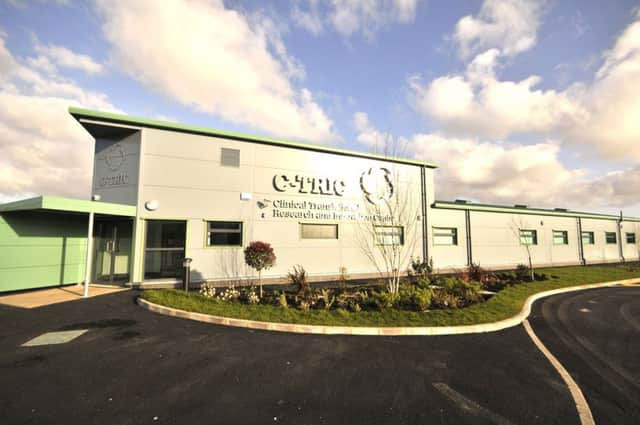Pioneering cancer drug trial under way in Derry


Tumour samples from men being treated locally are being collated to test the drug’s effectiveness at the Clinical Transitional Research and Innovation Centre (C-TRIC), labs on the Altnagelvin Hospital site.
The new trials are the result of a partnership with American pharmaceutical company Lantern Pharma and the PRAISE (prostate cancer artificial intelligence study using ex vivo models) trial is using artificial intelligence to test a cancer drug called LP-184 to predict which types of tumours are sensitive to it.
Advertisement
Hide AdAdvertisement
Hide AdThe company said the groundbreaking work, which is partially funded by Invest NI, does not involve human or animals trials due to the use of AI.
The new project will help guide future cancer research and clinical trials and early indications suggest there could also be benefits for research into the treatment of ovarian and liver cancer.
Initially 30 biopsy samples from the tumours of local men diagnosed with prostate cancer are being tested with the drug and this will rise to around 200 when the trial is complete.
Speaking from Dallas, Texas this week, Panna Sharma, Lantern Pharma CEO, told the ‘Journal:’ “C-TRIC and a lot of major research institutions are collaborating with commercial companies like ourselves bringing precision cancer therapies to life. The only way to do that is to understand the patient’s tumour more clearly. We are at an early stage of our work. It’s a very unique process.”
Advertisement
Hide AdAdvertisement
Hide AdMr. Sharma said that there were around 12 different types of prostate cancer and that treatment of this and other cancers was moving to a more individual patient-centred approach. “Prostate cancer is not just one disease,” he said. “It’s very, very different for different people, it’s multiple diseases characterised by the genome profile of the cancer and the patient. Some respond well to certain drugs and therapies and some don’t.”
The results of the Derry trials, the initial phase of which will run until the end of this year, will allow Lantern to have a much more targeted trial in the future once they establish which patients are best served by LP-184.
This in turn will better the chances of getting the drug to market, a process that normally takes five to seven years but could now be done in this case from within three to five years because of the use of AI and genome precision.
The use of Artificial Intelligence includes data from each of the tumour tests being collected through a sequencing process, with thousands of data points helping to advance the development of the drug.
Advertisement
Hide AdAdvertisement
Hide Ad“That saves tonnes of time and energy,” Mr Sharma said. “The most interesting thing we are finding is that the prostate cancer subtype most likely to respond has similarities with other tumour types, mostly liver and ovarian.”
With the advances in modern technology, the process of gathering data, which would have taken months to set up and months to look at the results less than a decade ago, can now be done almost in real time.
Mr Sharma said the use of Artificial Intelligence in this current study in Derry was blazing a trail for how future studies and trials can be done.
Praising the work being conducted at C-TRIC, he said: “This kind of early patient involvement in tumour analysis is going to be very important. These types of collaborations are really essential.
Advertisement
Hide AdAdvertisement
Hide Ad“C-TRIC’s links to patients and the hospital are very important. We’re very impressed by the calibre of resources, staff and more importantly their commitment.”
Genomics involves the sequencing of DNA codes of patients which helps with swifter diagnosis and personalised care for cancer and rare diseases, and Lantern’s drug is a DNA damage repair inhibitor which helps stop the cancer cells in a tumour regenerating, a process which will, hopefully, lead to tumours shrinking and dissipating.
Given the global efforts to invest in cancer research, management and potential cures, Mr. Sharma said that there was a “billion dollar question” over the success of the drug during the trial, while the most exciting thing was that this could have implications for the lives of millions of people diagnosed with prostate cancer and their families.
“That alone is worth it,” he said.
C-TRIC was set up almost a decade ago to promote and facilitate translational and clinical research.
Advertisement
Hide AdAdvertisement
Hide AdLocated close to Altnagelvin Hospital site, the unique facility is the result of a three-way partnership between the Western Health and Social Care Trust, Ulster University and Derry City & Strabane District Council.
Commenting on the project, C-TRIC, Ulster University has stated: “The primary objective is to reduce both the time to market and the costs associated with research and development of innovative health technologies, medical devices and therapeutics.”